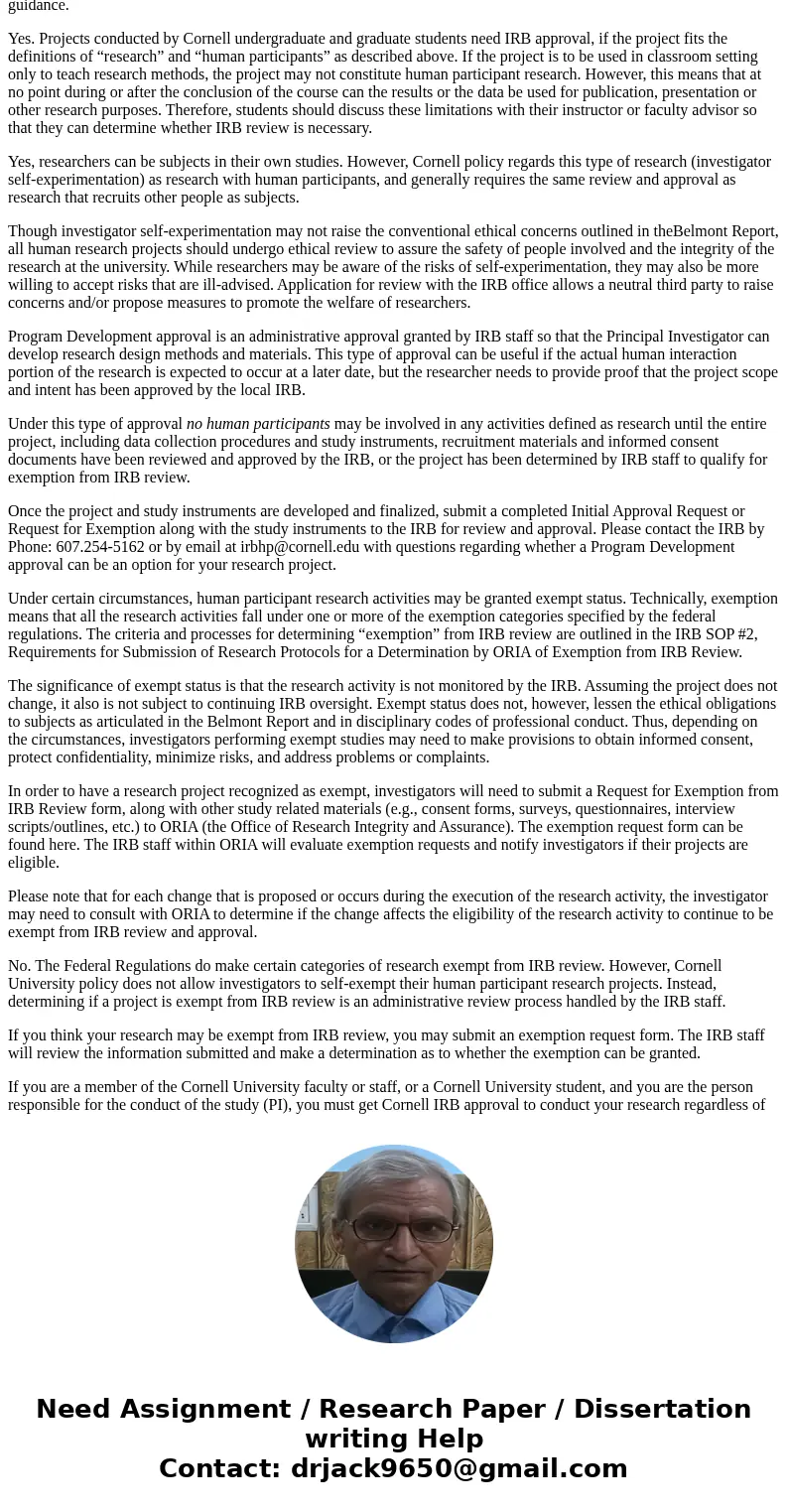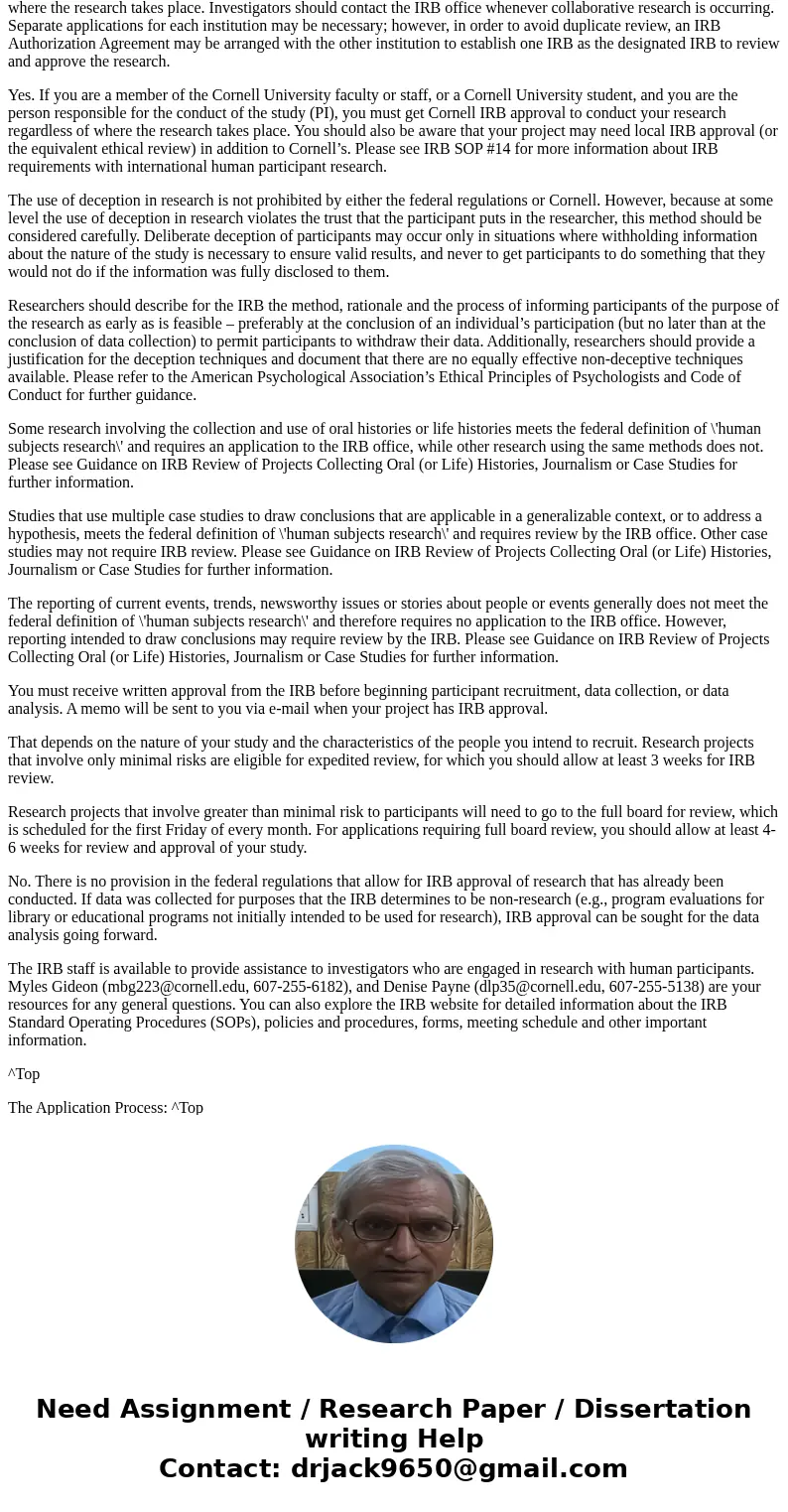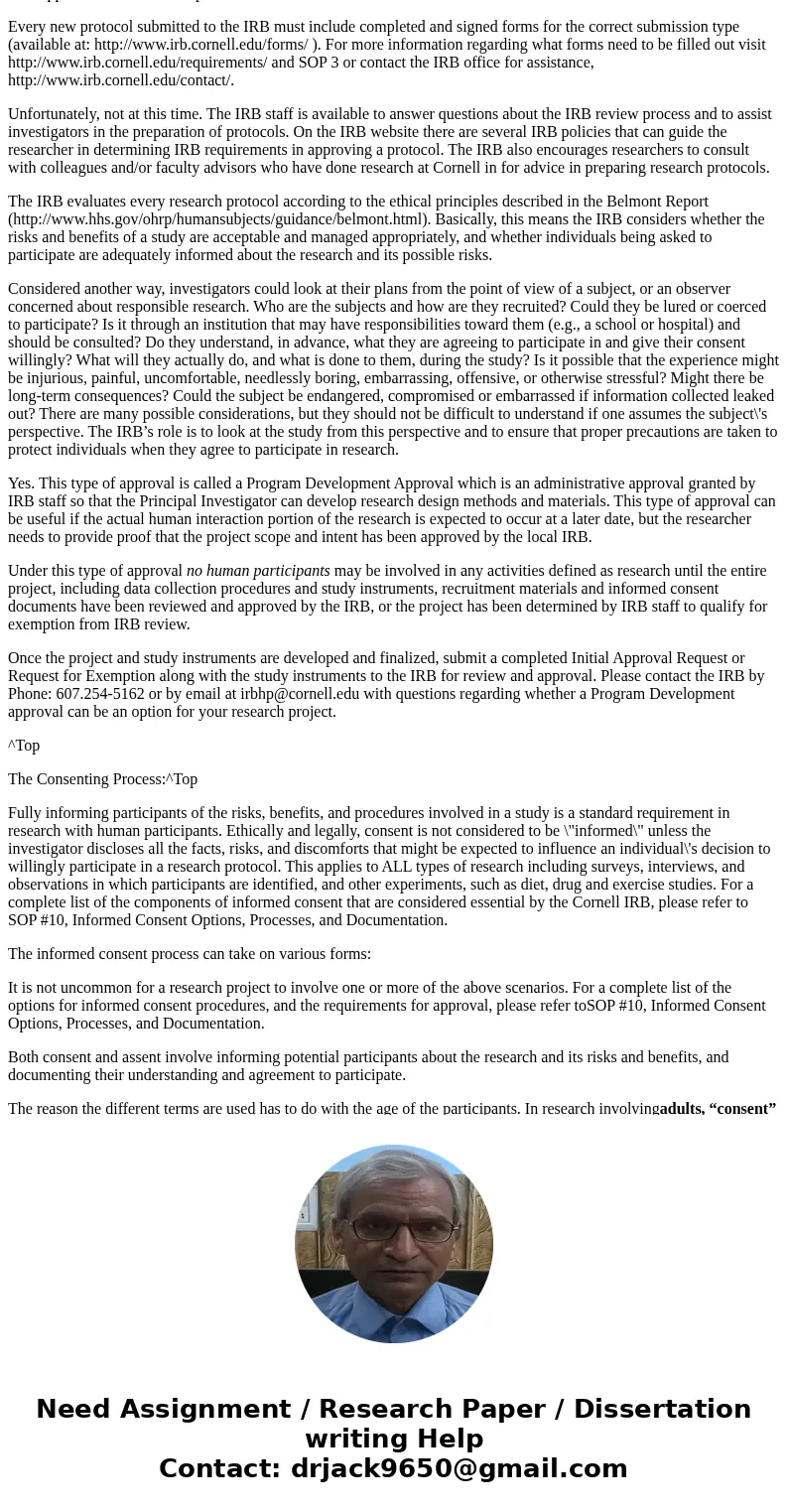Explain ethical issues related to your Final Project researc
Explain ethical issues related to your Final Project research program intervention. Explain whether these issues are actual or potential and provide a rationale for your answer. Explain the level of privacy that would be required according to an IRB for participants in your Final Project research program intervention, and explain why.
Solution
IRB is the acronym for Institutional Review Board for Human Participants. Any institution that receives federal funding to conduct research with human participants, such as Cornell University, is required to establish an IRB to review all research that directly or indirectly involves human participants, and to set forth institutional policy governing such research. Cornell University IRB operates under a charge.
The IRB for Human Participants has the authority to review, approve, disapprove or require changes in research or related activities involving human participants. Research reviewed by the IRB may also be subject to other review and approval or disapproval by officials at Cornell University. However, those officials may not approve research that has not been approved by the IRB for Human Participants. The IRB primary role is to ensure the protection of human participants as subjects of research at Cornell University.
According to Cornell University Policy, research is defined as “…a systematic investigation, including research development, testing and evaluation, designed to develop or contribute to generalizable knowledge.”
Activities which meet this definition constitute research for this policy, whether or not they are conducted or supported under a program which is considered research for other purposes. For example, some demonstration and service programs may include research activities.
Human subjects are “…living individuals about whom an investigator (whether professional or student) conducting research obtains
Intervention includes both physical procedures by which data are gathered (e.g., venipuncture) and manipulations of the subject or the subject\'s environment that are performed for research purposes (e.g, providing stimuli to gauge reaction and response).
Interaction includes communication or interpersonal contact between investigator and subject (for example, surveys and interviews).
Private information includes
Private information must be individually identifiable (i.e., the identity of a participant is associated with the information or may readily be ascertained by the investigator) in order for obtaining the information to constitute research involving human subjects.
ORIA has developed a decision tree to help illustrate these requirements.
In order for your project to be considered human participant research covered by Cornell’s Human Research Protection Program, the criteria for both definitions must be met. If you are unsure if your project involves research with human subjects, please consult with IRB staff who can provide guidance in making this determination.
All research projects that will involve human participants must be submitted for review and approval before beginning the study. This includes proposed research involving existing data and previously collected human fluid and tissue samples, as well as any advertising or other recruitment procedures. You can also get more information determining when a research activity needs IRB review in SOP 1 and the Decision Tree.
Yes, if the study meets the definition for research with human participants, as explained above. Cornell University’s Federalwide Assurance (FWA) with the U.S. Department of Health and Human Services states that all research being conducted under the auspices of this institution is subject to review and approval by the IRB. Written approval from the IRB must be in place before any interventions or interactions with human participants (e.g., recruitment) actually begin.
Yes, if your research project involves active data collection. Federal regulations and Cornell University policy require that ALL research involving intervention or interaction with human participants, regardless of whether or not identifying information is being collected, must be submitted for review prior to beginning the research study.
However, if your research project involves use of existing information collected from human participants (e.g., secondary datasets, existing biological samples), but there are not any identifiers linking individuals to the data/samples, then the activity may not require IRB review. Please see the IRB’sDecision Tree or contact the IRB staff for further guidance.
Yes. Projects conducted by Cornell undergraduate and graduate students need IRB approval, if the project fits the definitions of “research” and “human participants” as described above. If the project is to be used in classroom setting only to teach research methods, the project may not constitute human participant research. However, this means that at no point during or after the conclusion of the course can the results or the data be used for publication, presentation or other research purposes. Therefore, students should discuss these limitations with their instructor or faculty advisor so that they can determine whether IRB review is necessary.
Yes, researchers can be subjects in their own studies. However, Cornell policy regards this type of research (investigator self-experimentation) as research with human participants, and generally requires the same review and approval as research that recruits other people as subjects.
Though investigator self-experimentation may not raise the conventional ethical concerns outlined in theBelmont Report, all human research projects should undergo ethical review to assure the safety of people involved and the integrity of the research at the university. While researchers may be aware of the risks of self-experimentation, they may also be more willing to accept risks that are ill-advised. Application for review with the IRB office allows a neutral third party to raise concerns and/or propose measures to promote the welfare of researchers.
Program Development approval is an administrative approval granted by IRB staff so that the Principal Investigator can develop research design methods and materials. This type of approval can be useful if the actual human interaction portion of the research is expected to occur at a later date, but the researcher needs to provide proof that the project scope and intent has been approved by the local IRB.
Under this type of approval no human participants may be involved in any activities defined as research until the entire project, including data collection procedures and study instruments, recruitment materials and informed consent documents have been reviewed and approved by the IRB, or the project has been determined by IRB staff to qualify for exemption from IRB review.
Once the project and study instruments are developed and finalized, submit a completed Initial Approval Request or Request for Exemption along with the study instruments to the IRB for review and approval. Please contact the IRB by Phone: 607.254-5162 or by email at irbhp@cornell.edu with questions regarding whether a Program Development approval can be an option for your research project.
Under certain circumstances, human participant research activities may be granted exempt status. Technically, exemption means that all the research activities fall under one or more of the exemption categories specified by the federal regulations. The criteria and processes for determining “exemption” from IRB review are outlined in the IRB SOP #2, Requirements for Submission of Research Protocols for a Determination by ORIA of Exemption from IRB Review.
The significance of exempt status is that the research activity is not monitored by the IRB. Assuming the project does not change, it also is not subject to continuing IRB oversight. Exempt status does not, however, lessen the ethical obligations to subjects as articulated in the Belmont Report and in disciplinary codes of professional conduct. Thus, depending on the circumstances, investigators performing exempt studies may need to make provisions to obtain informed consent, protect confidentiality, minimize risks, and address problems or complaints.
In order to have a research project recognized as exempt, investigators will need to submit a Request for Exemption from IRB Review form, along with other study related materials (e.g., consent forms, surveys, questionnaires, interview scripts/outlines, etc.) to ORIA (the Office of Research Integrity and Assurance). The exemption request form can be found here. The IRB staff within ORIA will evaluate exemption requests and notify investigators if their projects are eligible.
Please note that for each change that is proposed or occurs during the execution of the research activity, the investigator may need to consult with ORIA to determine if the change affects the eligibility of the research activity to continue to be exempt from IRB review and approval.
No. The Federal Regulations do make certain categories of research exempt from IRB review. However, Cornell University policy does not allow investigators to self-exempt their human participant research projects. Instead, determining if a project is exempt from IRB review is an administrative review process handled by the IRB staff.
If you think your research may be exempt from IRB review, you may submit an exemption request form. The IRB staff will review the information submitted and make a determination as to whether the exemption can be granted.
If you are a member of the Cornell University faculty or staff, or a Cornell University student, and you are the person responsible for the conduct of the study (PI), you must get Cornell IRB approval to conduct your research regardless of where the research takes place. Investigators should contact the IRB office whenever collaborative research is occurring. Separate applications for each institution may be necessary; however, in order to avoid duplicate review, an IRB Authorization Agreement may be arranged with the other institution to establish one IRB as the designated IRB to review and approve the research.
Yes. If you are a member of the Cornell University faculty or staff, or a Cornell University student, and you are the person responsible for the conduct of the study (PI), you must get Cornell IRB approval to conduct your research regardless of where the research takes place. You should also be aware that your project may need local IRB approval (or the equivalent ethical review) in addition to Cornell’s. Please see IRB SOP #14 for more information about IRB requirements with international human participant research.
The use of deception in research is not prohibited by either the federal regulations or Cornell. However, because at some level the use of deception in research violates the trust that the participant puts in the researcher, this method should be considered carefully. Deliberate deception of participants may occur only in situations where withholding information about the nature of the study is necessary to ensure valid results, and never to get participants to do something that they would not do if the information was fully disclosed to them.
Researchers should describe for the IRB the method, rationale and the process of informing participants of the purpose of the research as early as is feasible – preferably at the conclusion of an individual’s participation (but no later than at the conclusion of data collection) to permit participants to withdraw their data. Additionally, researchers should provide a justification for the deception techniques and document that there are no equally effective non-deceptive techniques available. Please refer to the American Psychological Association’s Ethical Principles of Psychologists and Code of Conduct for further guidance.
Some research involving the collection and use of oral histories or life histories meets the federal definition of \'human subjects research\' and requires an application to the IRB office, while other research using the same methods does not. Please see Guidance on IRB Review of Projects Collecting Oral (or Life) Histories, Journalism or Case Studies for further information.
Studies that use multiple case studies to draw conclusions that are applicable in a generalizable context, or to address a hypothesis, meets the federal definition of \'human subjects research\' and requires review by the IRB office. Other case studies may not require IRB review. Please see Guidance on IRB Review of Projects Collecting Oral (or Life) Histories, Journalism or Case Studies for further information.
The reporting of current events, trends, newsworthy issues or stories about people or events generally does not meet the federal definition of \'human subjects research\' and therefore requires no application to the IRB office. However, reporting intended to draw conclusions may require review by the IRB. Please see Guidance on IRB Review of Projects Collecting Oral (or Life) Histories, Journalism or Case Studies for further information.
You must receive written approval from the IRB before beginning participant recruitment, data collection, or data analysis. A memo will be sent to you via e-mail when your project has IRB approval.
That depends on the nature of your study and the characteristics of the people you intend to recruit. Research projects that involve only minimal risks are eligible for expedited review, for which you should allow at least 3 weeks for IRB review.
Research projects that involve greater than minimal risk to participants will need to go to the full board for review, which is scheduled for the first Friday of every month. For applications requiring full board review, you should allow at least 4-6 weeks for review and approval of your study.
No. There is no provision in the federal regulations that allow for IRB approval of research that has already been conducted. If data was collected for purposes that the IRB determines to be non-research (e.g., program evaluations for library or educational programs not initially intended to be used for research), IRB approval can be sought for the data analysis going forward.
The IRB staff is available to provide assistance to investigators who are engaged in research with human participants. Myles Gideon (mbg223@cornell.edu, 607-255-6182), and Denise Payne (dlp35@cornell.edu, 607-255-5138) are your resources for any general questions. You can also explore the IRB website for detailed information about the IRB Standard Operating Procedures (SOPs), policies and procedures, forms, meeting schedule and other important information.
^Top
The Application Process: ^Top
Every new protocol submitted to the IRB must include completed and signed forms for the correct submission type (available at: http://www.irb.cornell.edu/forms/ ). For more information regarding what forms need to be filled out visit http://www.irb.cornell.edu/requirements/ and SOP 3 or contact the IRB office for assistance, http://www.irb.cornell.edu/contact/.
Unfortunately, not at this time. The IRB staff is available to answer questions about the IRB review process and to assist investigators in the preparation of protocols. On the IRB website there are several IRB policies that can guide the researcher in determining IRB requirements in approving a protocol. The IRB also encourages researchers to consult with colleagues and/or faculty advisors who have done research at Cornell in for advice in preparing research protocols.
The IRB evaluates every research protocol according to the ethical principles described in the Belmont Report (http://www.hhs.gov/ohrp/humansubjects/guidance/belmont.html). Basically, this means the IRB considers whether the risks and benefits of a study are acceptable and managed appropriately, and whether individuals being asked to participate are adequately informed about the research and its possible risks.
Considered another way, investigators could look at their plans from the point of view of a subject, or an observer concerned about responsible research. Who are the subjects and how are they recruited? Could they be lured or coerced to participate? Is it through an institution that may have responsibilities toward them (e.g., a school or hospital) and should be consulted? Do they understand, in advance, what they are agreeing to participate in and give their consent willingly? What will they actually do, and what is done to them, during the study? Is it possible that the experience might be injurious, painful, uncomfortable, needlessly boring, embarrassing, offensive, or otherwise stressful? Might there be long-term consequences? Could the subject be endangered, compromised or embarrassed if information collected leaked out? There are many possible considerations, but they should not be difficult to understand if one assumes the subject\'s perspective. The IRB’s role is to look at the study from this perspective and to ensure that proper precautions are taken to protect individuals when they agree to participate in research.
Yes. This type of approval is called a Program Development Approval which is an administrative approval granted by IRB staff so that the Principal Investigator can develop research design methods and materials. This type of approval can be useful if the actual human interaction portion of the research is expected to occur at a later date, but the researcher needs to provide proof that the project scope and intent has been approved by the local IRB.
Under this type of approval no human participants may be involved in any activities defined as research until the entire project, including data collection procedures and study instruments, recruitment materials and informed consent documents have been reviewed and approved by the IRB, or the project has been determined by IRB staff to qualify for exemption from IRB review.
Once the project and study instruments are developed and finalized, submit a completed Initial Approval Request or Request for Exemption along with the study instruments to the IRB for review and approval. Please contact the IRB by Phone: 607.254-5162 or by email at irbhp@cornell.edu with questions regarding whether a Program Development approval can be an option for your research project.
^Top
The Consenting Process:^Top
Fully informing participants of the risks, benefits, and procedures involved in a study is a standard requirement in research with human participants. Ethically and legally, consent is not considered to be \"informed\" unless the investigator discloses all the facts, risks, and discomforts that might be expected to influence an individual\'s decision to willingly participate in a research protocol. This applies to ALL types of research including surveys, interviews, and observations in which participants are identified, and other experiments, such as diet, drug and exercise studies. For a complete list of the components of informed consent that are considered essential by the Cornell IRB, please refer to SOP #10, Informed Consent Options, Processes, and Documentation.
The informed consent process can take on various forms:
It is not uncommon for a research project to involve one or more of the above scenarios. For a complete list of the options for informed consent procedures, and the requirements for approval, please refer toSOP #10, Informed Consent Options, Processes, and Documentation.
Both consent and assent involve informing potential participants about the research and its risks and benefits, and documenting their understanding and agreement to participate.
The reason the different terms are used has to do with the age of the participants. In research involvingadults, “consent” is obtained from individuals to participate in the study. In research involving minors, a parent must give permission to allow the child to participate in the research, and children who are able to understand information about participation are asked to “assent” or agree to participate as well.
In general, yes, but there are some limited exceptions. The Cornell IRB is responsible for ensuring that basic ethical principles are abided by in all research. The expectation that the informed consent of research participants be obtained is based upon the Belmont principle of respect for persons, and regarded as extremely important in conducting ethical research. The IRB has the authority to waive some or all of the federal requirements for informed consent in certain extenuating circumstances. A request for waiver of informed consent must be specifically justified by the researcher in the proposal to the IRB.
Used most commonly, signed informed consent allows prospective participants to document their agreement to take part in research activities by signing and dating the consent document.
Not always. In certain situations, the IRB can waive the requirement that you obtain the participant\'s signature on the consent form.
A waiver of documentation of informed consent is a request whereby a signed consent document is not required. Examples include implied and verbal consent. Consent will still be obtained from participants; however, they will not be required to sign the consent form. There are only two circumstances when the IRB may waive the requirement to obtain a signed consent form:
A waiver of informed consent could: (1) alter some or all of the required elements of informed consent or (2) completely waive the requirement to obtain informed consent. The IRB may approve a consent procedure which does not include or alters some or all of the required elements of informed consent provided all of the following are true:
Examples of types of studies in which some or all elements of consent have been waived include retrospective chart reviews, studies of existing pathology specimens, ethnographic research, studies that require deception or passive (opt-out) consent.
PLEASE NOTE: The IRB will take into consideration the risks and potential harms involved in the research before granting a waiver of informed consent. Additionally, there are restrictions for when the IRB may waive the requirements for child assent and parental permission. Please refer to SOP #11, Informed Consent, Enrollment, and Other Considerations for Research Involving Children for full details.
No. There are two sets of circumstances where the IRB may waive the requirement for parental permission:
Yes. If the proposed study is truly \"anonymous\" - no coding for identifiers (e.g., names, social security numbers, drivers license numbers, etc.), a modified informed consent form (often called an information sheet) may be used. That is, all of the elements of consent must be documented for the participant, but the signature line is replaced with a statement informing the participant that completion and return of the survey is considered implied consent. If, however, the procedures involve risk or biological sample collections, written consent may be required.
For more information about the possibilities for waiver of signed or written informed consent, please refer to SOP # 10, Informed Consent Options, Processes, and Documentation.
Implied consent is the tacit indication that a person has knowingly agreed to participate in research by performing a research activity or task. By completing the research task (e.g., completion of a questionnaire, interview, survey, etc.), the participant has provided consent to participate in the research.
Implied consent is actually a type of a waiver of documentation of informed consent. Before granting such a waiver, the IRB may require the researcher to provide the participants with a written summary or an information sheet about the research, including: (1) purpose of research; (2) time involved; (3) assessment of minimal risk; (4) statement regarding benefit to participants; (5) contact for questions about the research; and (6) contact for questions about rights as a research participant.
There are a number of instances where this type of consent is helpful. For example, you wish to mail out a survey. The survey does not ask for any identifiable information. The cover letter accompanying the survey could be written in such a manner as to serve as the \"implied\" informed consent form. The letter would need to contain a statement indicating that completion and return of the survey implies consent to participate in the research.
For Internet-based surveys, it is sometimes appropriate to use implied informed consent. Participants would still need to be presented with the consent information, but would be informed that their consent is implied by submitting the completed survey.
If, for study design purposes, the researcher needs to keep track of who participated or if the IRB determines that some sort of documented consent is required, instead of \"signed\" informed consent, the researcher may email the consent form to participants who may then type their name and the date into the spaces provided on the consent form, and return it to the researcher via email. This process may be appropriate for data collected via email, chat rooms, online interviews, etc. Alternatively, some Internet-based survey vendors and/or software packages provide a means to record whether a respondent has consented to participate before beginning a survey (e.g., a date/time stamp feature).
For protocols involving oral consent the following information is required to be communicated to the participant:
It may be pertinent to request the PI to offer additional information depending on the nature of the study. It is up to the Administrator to suggest additional information to be included in order to further protect the participant.
Click for a sample informed consent form on the IRB website.
^Top
Training Related Topics: ^Top
At Cornell University, all investigators and research staff much successfully complete the CITI Program for training in the ethical conduct of research with human participants and update it at least once every five years.
Additionally, investigators and research staff must be qualified by training and experience for the research they will be conducting. It is important to understand that the responsibility for the welfare of participants lies with the principal investigator, even when participants have given consent. Investigators and research staff must have the necessary training and expertise to
All faculty, students, and staff proposing to use human participants in research under the auspices of Cornell University are required to complete the human participants training. Approvals for including human participants in proposed research projects will be not be granted until this training has been completed and verified by ORIA. For additional information on this topic, please see IRB Policy II, \"Verification of Training on the Protection of Human Participants\".
You can access the human participant training online. The IRB may accept alternate training in lieu of the CITI training if the researcher can produce documentation related to the training course/s, the institution offering the training, the date of completion and the score received. Such documentation should accompany the proposal submission or be sent to the IRB office upon request.
Yes. The Institutional Review Board office staff strives to provide information and assistance to investigators and research staff in several ways. Several times throughout the year the IRB may hold formal seminars to help educate the research community about different IRB and human research topics. Arrangements can be made to have IRB staff present informational sessions for small groups which can be tailored for the needs of a specific group.
The IRB staff is available during Cornell University business hours to answer your questions about the IRB process and provide assistance with any human subjects.
^Top
Lifecycle of the Protocol:^Top
Any and all changes to an approved research study must be submitted for review and approval prior to implementing the change(s) into the research study. This page provides examples on the types of changes that require an amendment: http://www.irb.cornell.edu/forms/amendmentGuidance.htm.
Investigators with approved projects must submit an Amendment application if there are significant changes involving any of the study protocols, study design, informed consent procedures, or principal investigator team. The administrator and chair of IRB review all amendment applications, and assign them to either expedited or full committee review.
No. The expiration date of the original approval is not changed by the review and approval of an amendment.
If IRB approval of the human research expires, all study procedures related to the protocol under review must cease, including recruitment, advertisement, screening, enrollment, consent, interventions, interactions, and collection of private identifiable information. Continuing human research procedures is a violation of federal regulations. You need to receive continued approval from the IRB in order to continue research.
It is the responsibility of the principal investigator (PI) to ensure continued approval of his or her human participant research study. As a courtesy, approximately 40 days prior to the approval expiration date, the IRB office will send an email to the principal investigator and the faculty advisor (if the PI is a student), alerting them to the impending approval expiration. If no response is received to the reminders, a notice indicating the approval for the study expired may be sent after the approval expiration date. If approval is allowed to expire, all research on the study must cease until renewed approval is granted. Progress of approved research must be reported, in the manner prescribed by the IRB, on the basis of risks to participants, no less than once a year.
For all renewal forms and more information visit our forms website.
^Top
Unanticipated Problems/Adverse Events:^Top
Serious adverse events must be reported to the IRB immediately, with a written report by the PI following within 24 hours of the PI’s becoming aware of the event. Serious adverse events are (1) death of a research participant; or (2) serious injury to a research participant.
All other non-serious unanticipated problems should be reported to the IRB within 2 weeks of the first awareness of the problem by the Protocol PI or another researcher, ORIA, or a member of the IRB. Prompt reporting is important, as unanticipated problems often require some modification of study procedures, protocols, and/or informed consent processes. Such modifications require the review and approval of the IRB.
The Unexpected Event Report form is available on the IRB website.
Yes. If an unanticipated problem poses a risk(s) to the participants or others, the IRB may temporarily discontinue a research project until a thorough investigation has been conducted. Dependent on the investigation, the IRB may request changes to a research study or permanently discontinue the research study. Please see SOP #6, Suspensions and Terminations of IRB Approval of Research Protocols.
Yes. As a result of the IRB\'s investigation of the unanticipated problem, revisions to the approved research study and the informed consent form may be requested.







 Homework Sourse
Homework Sourse